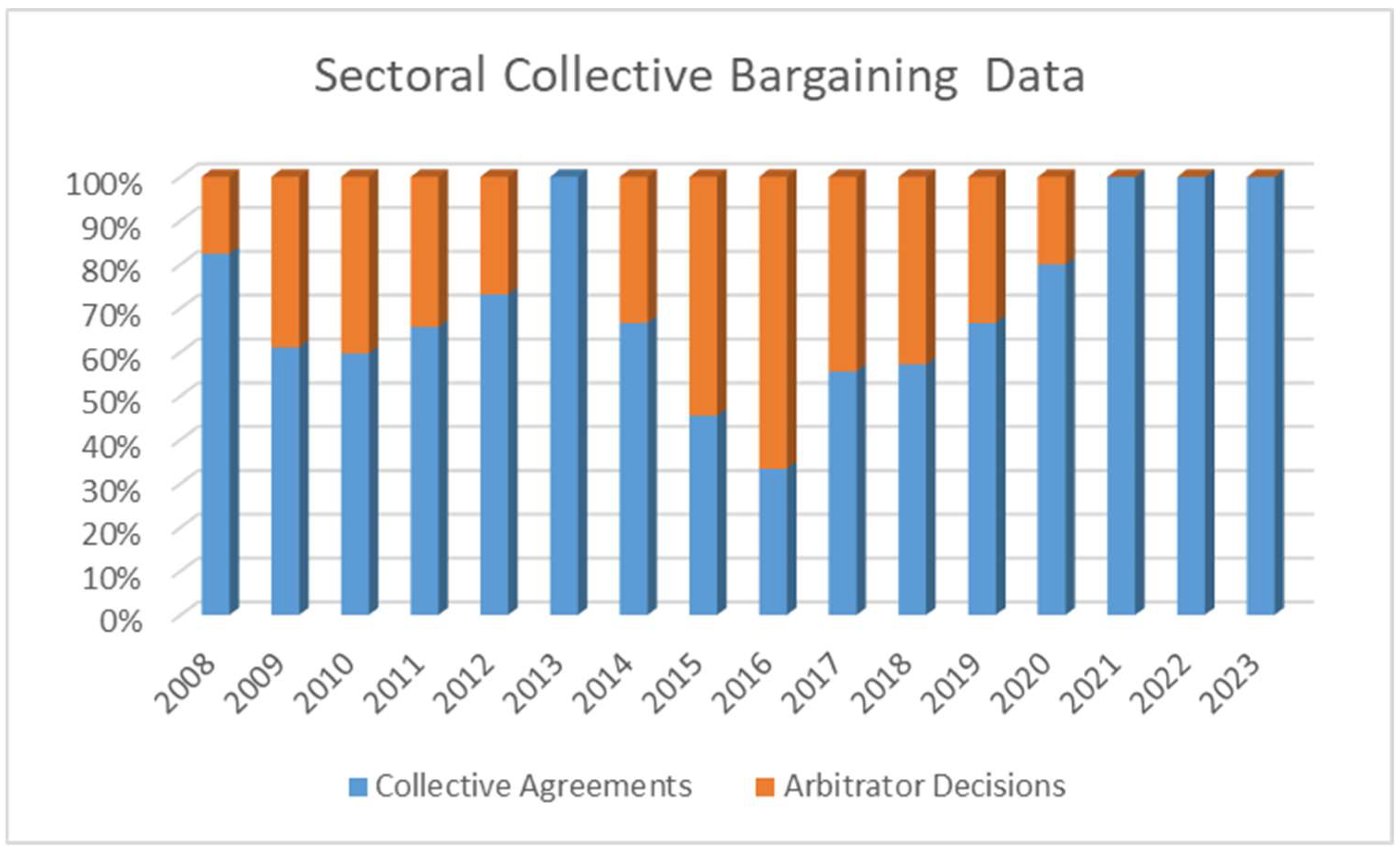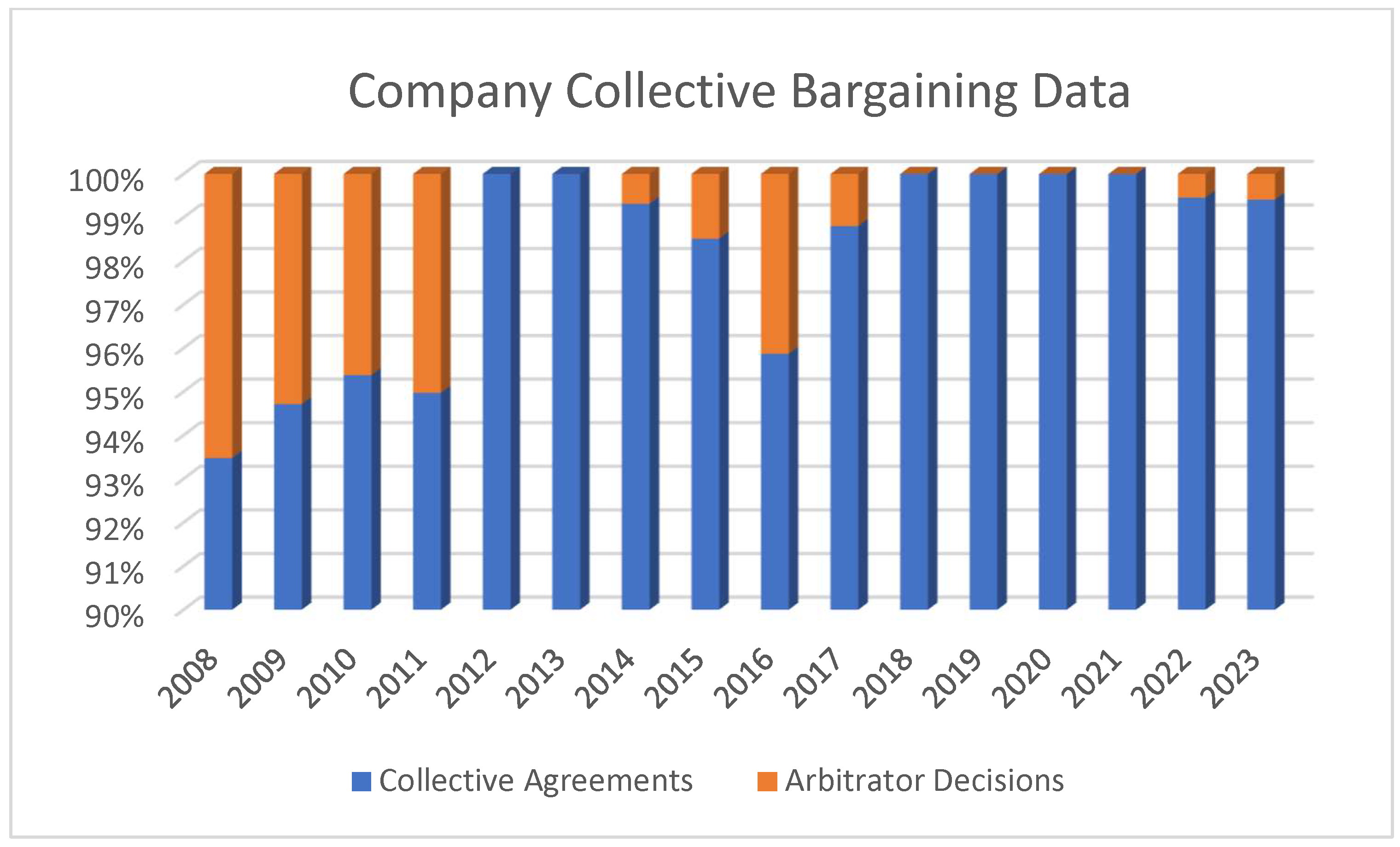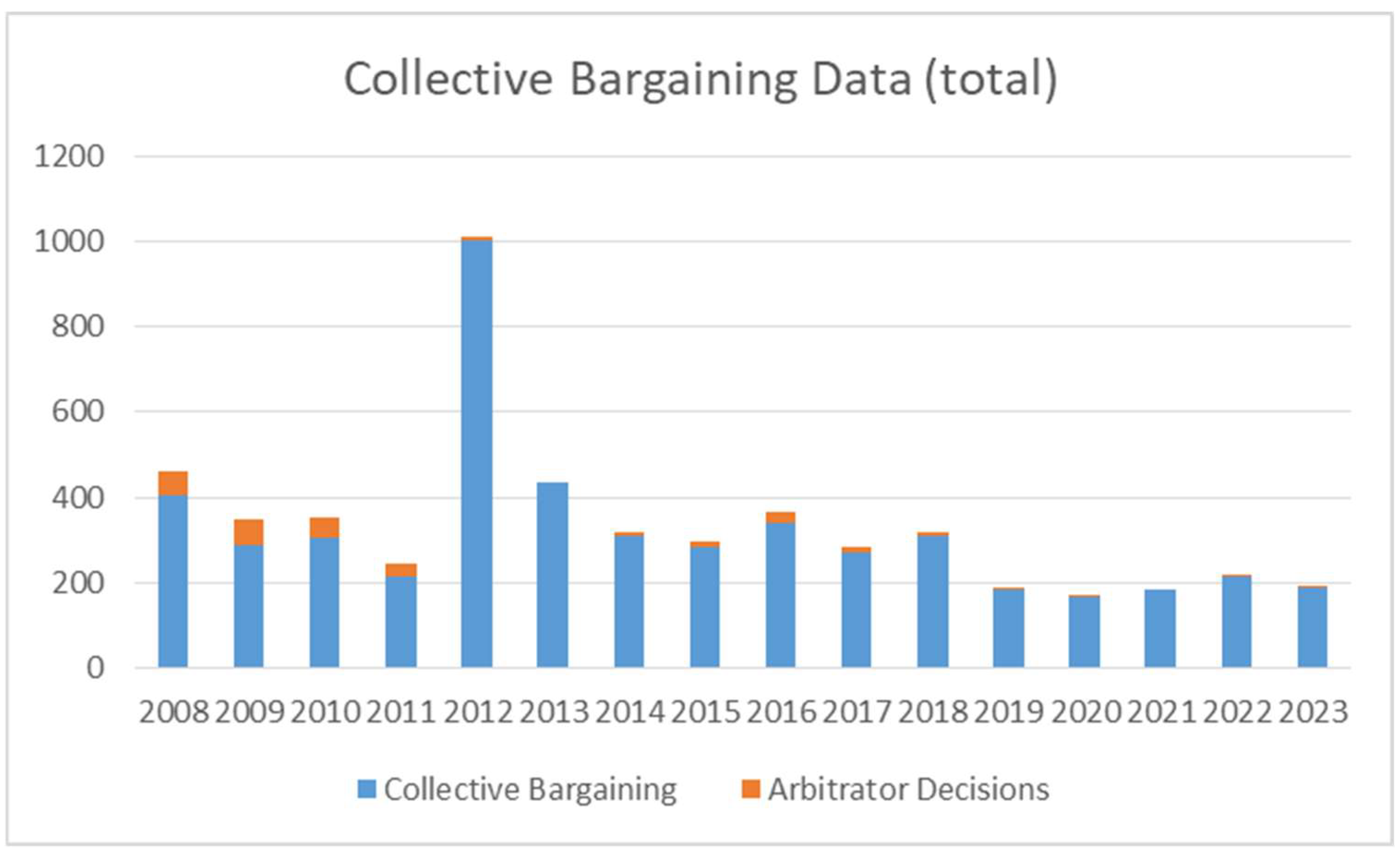Collective Bargaining in Post-Memoranda Greece: Could It Guarantee Decent Work by Greek Employees?
Abstract
1. Introduction
Current Trends in Collective Bargaining
2. Methods
3. The Greek Case
- The disagreements that arose between the social partners while negotiating on wages and benefits;
- The institutional amendments in the period of 2012–2014 (regarding arbitration);
- Structural reasons connected to the economic crisis, and the resulting downfall of the Greek economy (during these years, unemployment increased and the number of companies decreased).
4. Findings
5. Discussion
“… in countries with little previous tradition of such concentration, the crisis of 2008–09 does not seem to have had the same effect. This may be in part a reflection of the speed and enormity of the crisis: where the necessary institutions were not already well established, the urgency of the situation provided little scope for their creation”.(2010)
6. Conclusions
- Employers of companies experiencing difficulties could have the opportunity to opt out of collective regulation for a short period of time.
- The state could regulate migrants’ wages and terms of employment if they are not represented in trade unions.
- The National General Collective Labor Agreement (EGSSE) may be linked with motives of trade union participation. Thus, CB coverage could be expanded.
- The state could provide incentives for employers in order to conclude company-level agreements using tax exceptions or through a reduction in the non-wage labor cost for the enterprises that conclude CAs on their own or with the supporting services of the Greek Organization for Mediation and Arbitration.
Prospects for Future Research
Funding
Institutional Review Board Statement
Informed Consent Statement
Data Availability Statement
Conflicts of Interest
References
- Adamopoulou, Effrosyni, and Ernesto Villanueva. 2022. Employment and wage effects of extending collective bargaining agreements: Sectoral collective contracts reduce inequality but may lead to job losses among workers with earnings close to the wage floors. IZA World of Labor 136: 1–12. [Google Scholar] [CrossRef]
- Afonso, Alexandre, Μaximilian Kiecker, and Pedro Goulart. 2025. Determinants of Social Dialogue in European Countries (1980–2018). British Journal of Industrial Relations 63: 341–53. [Google Scholar] [CrossRef]
- Baldona, David Luque, and Sergio González Begega. 2015. Austerity and welfare reform in South-Western Europe: A farewell to corporatism in Italy, Spain and Portugal. European Journal of Social Security 17: 271–91. [Google Scholar] [CrossRef]
- Besamusca, Janna, and Marta Kahancová. 2024. Mind the Gap between Your Collective Agreement and Your Wages: Assessing the Wage Fixing Capacity of Collective Bargaining in Europe. BARWAGE Project Report 16. Amsterdam: WageIndicator Foundation. [Google Scholar] [CrossRef]
- Brandl, Bernd, and Nils Braakmann. 2021. The effects of collective bargaining systems on the productivity function of firms: An analysis of bargaining structures and processes and the implications for policy making. Industrial Relations 52: 218–36. [Google Scholar] [CrossRef]
- Fick, Barbara J. 2009. Not Just Collective Bargaining: The Role of Trade Unions in Creating and Maintaining a Democratic Society. Journal of Labor and Society 12: 249–64. [Google Scholar] [CrossRef]
- Giannakopoulos, Nicholas, and Ioannis Laliotis. 2019. Firm-level bargaining and wage adjustments before and during the crisis. In Greek Employment Relations in Crisis: Problems, Challenges, and Prospects. Edited by Horen Voskeritsian, Panos Kapotas and Christina Niforou. London: Routledge, pp. 83–102. [Google Scholar]
- Glassner, Vera, and Maarten Keune. 2010. Negotiating the Crisis? Collective Bargaining in Europe During the Economic Downturn. Workink Paper 10. Geneva: International Labor Office. [Google Scholar]
- Günther, Wolfgang, and Martin Höpner. 2023. Why does Germany abstain from statutory bargaining extensions? Explaining the exceptional German erosion of collective wage bargaining. Economic and Industrial Democracy 44: 88–108. [Google Scholar] [CrossRef]
- Hayter, Susan, and Valentina Stoevska. 2011. Social Dialogue Indicators: International Statistical Inquiry 2008–2009 (Technical Brief). Geneva: International Labour Office. [Google Scholar]
- Hijzen, Alexander, Pedro Martins, and Jante Parlevliet. 2017. Collective Bargaining Through the Magnifying Glass: A Comparison between the Netherlands and Portugal. Working Paper No. 576. Washington, DC: International Monetary Fund. [Google Scholar]
- Hyman, Richard. 2010. Social Dialogue and Industrial Relations During the Economic Crisis: Innovative Practices or Business as Usual? Working Paper 10. Geneva: International Labor Office. [Google Scholar]
- Ibsen, Christian. Lynne, and Maarten Keune. 2018. Organised Decentralisation of Collective Bargaining: Case Studies of Germany, Netherlands and Denmark. OECD Social, Employment and Migration Working Papers. Paris: Organisation for Economic Cooporation and Development, OECD. [Google Scholar] [CrossRef]
- Ioannou, Christos. 2011. Tectonic changes in the wage formation system in Greece. Greek Review of Social Research 2011: 133–64. (In Greek). [Google Scholar]
- Ioannou, Christos. 2015. Collective Bargaining, collective agreements and Wages in Greek economic Crisis. Labor Law Review 74: 1373–401. [Google Scholar]
- Ioannou, Christos. 2019. Collective Bargaining, decentralisation and wage adjustment for internal devaluation. In Greek Employment Relations in Crisis: Problems, Challenges, and Prospects. Edited by Horen Voskeritsian, Panos Kapotas and Christina Niforou. London: Routledge, pp. 31–58. [Google Scholar]
- Ioannou, Christos, and Kostas Papadimitriou. 2013. Collective Bargaining in Greece in 2011 and 2012: Trends and Perspectives. Athens: Organization for Mediation and Arbitration (OMED), No 2. (In Greek) [Google Scholar]
- Kauhanen, Antti. 2024. The Effects of the Decentralization of Collective Bargaining on Wage Differences Aamong Employee Groups. ETLA Working Papers No 118. Available online: http://pub.etla.fi/ETLA-Working-Papers-118.pdf (accessed on 30 June 2025).
- Koukiadaki, Aristea, and Lefteris Kretsos. 2012. Opening Pandora’s box: The sovereign debt crisis and labor market regulation in Greece. Industrial Law Journal 41: 276–304. [Google Scholar] [CrossRef]
- Koutroukis, Theodore. 2004. Social Dialogue at the local level: The case of Imathia. Social Science Tribune 40: 149–69. (In Greek). [Google Scholar]
- Koutroukis, Theodore, and Lefteris Kretsos. 2004. Social Dialogue in Greece: The National and the Local Dimension, in Labor. Athens: Institute for Urban Environment and Human Resources. (In Greek) [Google Scholar]
- Koutroukis, Theodore, and Lefteris Kretsos. 2008. Social dialogue in areas and times of depression: Evidence from regional Greece. Global Journal of Business Management 2: 1–8. [Google Scholar]
- Koutroukis, Theorode, and Spyros Roukanas. 2016. Social Dialogue in the Era of Memoranda: The consequences of Austerity and Deregulation measures on the Greek Social Partnership Process. In The First Decade of Living with the Global Crisis, Economic and Social Developments in the Balkans, and Eastern Europe. Edited by Anastasios Karassavoglou, Zoran Aranelović, Srdan Marinković and Persefoni Polychronidou. Cham: Springer, pp. 73–82. [Google Scholar]
- Kouzis, Giannis. 2015. Labor at the gunpoint during the period of crisis and Memoranda. Social Policy 3: 7–18. (In Greek). [Google Scholar]
- Lanara-Tzotze, Zoe. 2013. The Impact of Anti-Crisis Measures and the Social and Employment Situation: Greece, Brussels, European Economic and Social Committee, Visits and Publications Unit. Available online: https://www.econbiz.de/Record/the-impact-of-the-anti-crisis-measures-and-the-social-and-employment-situation-greece-study-lanara-tzotze-zoe/10010242662 (accessed on 21 July 2021).
- Lavdas, Kostas. 2007. Interest Groups in Disjointed Corporatism: Social Dialogue in Greece and European ‘Competitive Corporatism’. West European Politics 28: 297–316. [Google Scholar] [CrossRef]
- Luebker, Malte, and Thilo Janssen. 2022. WSI, WSI European Collective Bargaining Report 2021–2022, Collective Bargaining in Times of Crisis, War and Inflation. Report No 776. Available online: https://www.econstor.eu/handle/10419/263000 (accessed on 31 March 2024).
- Malagardi, Athina, and Miltiadis Stampoulis. 2025. Collective Bargaining in Greece in the Years 2013–2023. Athens: Sakkoulas-OMED. (In Greek) [Google Scholar]
- Nelson, Jane, and Simon Zadek. 2000. Partnership Alchemy: New Social Partnerships in Europe. Copenhagen: The Copenhagen Centre. [Google Scholar]
- OECD. 2019. Negotiating Our Way Up: Collective Bargaining in a Changing World of Work. Paris: OECD Publishing. [Google Scholar] [CrossRef]
- OKE. 1999. Social Dialogue in Southeastern Europe, Opinion No 29. Athens: OKE. [Google Scholar]
- OKE. 2002. Social Dialogue in Greece: Assessment-Trends- Prospects, (Opinion). Athens: OKE. (In Greek) [Google Scholar]
- OMED. 2012. Legal Framework of Collective Bargaining, Mediation and Arbitration, (Updated Legislation). Athens: OMED. (In Greek) [Google Scholar]
- OMED. 2023. Report of Organization for Mediation and Arbitrations Towards the Consultations on National Minimum Wage. Athens: OMED. (In Greek) [Google Scholar]
- OMED. 2025. Report of Organization for Mediation and Arbitration Regarding the Consultation for Minimum Wage of the Year 2025. Athens: OMED. (In Greek) [Google Scholar]
- Palokangas, Tapio. 2002. The Political Economy of Collective Bargaining. CESifo Working Paper No. 719 (4). Available online: https://papers.ssrn.com/sol3/papers.cfm?abstract_id=316760 (accessed on 19 July 2020).
- Papadakis, Konstantinos. 2014. Introduction: Policy reform in southern Europe and Ireland and the role of social dialogue. In The Governance of Policy Reforms in Southern Europe and Ireland Social Dialogue Actors and Institutions in Times of Crisis. Edited by Konstantonos Papadakis and Youcef Ghellab. Geneva: International Labour Office, pp. 1–12. [Google Scholar]
- Papadopoulos, Orestis, and Gregoris Ioannou. 2023. Working in hospitality and catering in Greece and the UK: Do trade union membership and collective bargaining still matter? European Journal of Industrial Relations 29: 105–22. [Google Scholar] [CrossRef]
- Patra, Eleni. 2012. Social Dialogue and Collective Bargaining in the Time of Crisis: The Case of Greece. Working Paper N0 38. Geneva: ILO. [Google Scholar]
- Pierros, Christos. 2023. Collective Bargaining and Collective Labor Agreements in Post-Crisis Period of Greek Economy: Macroeconomic and Sectoral Performance and Prospects. Athens: INE GSEE. [Google Scholar]
- Rainone, Silvia, and Nicola Countouris. 2021. Collective Bargaining and Self-employed Workers: The Need for a Paradigm Shift. ETUI Policy Brief. pp. 1–10. Available online: https://papers.ssrn.com/sol3/papers.cfm?abstract_id=3884802 (accessed on 4 February 2023).
- Rompoti, Eleni, Alexis Ioannides, and Theodore Koutroukis. 2022. Employment Flexibility and Industrial Relations Reforms in Greece of Memoranda. E-Journal of International and Comparative Labor Studies 11: 40–63. [Google Scholar]
- Sochas, Laura, and Aaron Reeves. 2023. Does collective bargaining reduce health inequalities between labor market insiders and outsiders? Socio-Economic Review 21: 827–62. [Google Scholar] [CrossRef]
- Traxler, Franz, and Bernd Brandt. 2011. The economic impact of collective bargaining coverage. In The Role of Collective Bargaining in the Global Economy: Negotiating for Social Justice. Edited by Susan Hayter. Cheltenham: Elgar & ILO, pp. 227–53. [Google Scholar] [CrossRef]
- Tsarouhas, Dimitris. 2012. The political origins of the Greek Crisis Domestic Failures and the EU Factor. Insight Turkey 14: 83–98. [Google Scholar]
- UNI Europa Global Union. n.d. Collective Bargaining Systems in Europe: Some Stylised Facts. In Brussels: UNI Europa Regional Conference Paper. Nyon: UNI Europa Global Union. [Google Scholar]
- Venieris, Dimitris. 2011. Economic Crisis and Social Policy Deregulation: The New «Greece Minor Disaster» 2010–2011. Greek Review of Social Research 134–135: 101–31. (In Greek). [Google Scholar]
- Visser, Jelle. 2024. Did employers abandon collective bargaining? A comparative analysis of the weakening of collective bargaining in the OECD. Industrial Relations 55: 350–77. [Google Scholar] [CrossRef]
- Vogiatzoglou, Markos. 2014. Die griechische Gewerkschaftbewegung: Protest und Sozialbewegungen im Kontext der austeritatspolitiki. WSI Mitteilungen 67: 361–68. [Google Scholar] [CrossRef]
- Voskeritsian, Horen, and Andreas Kornelakis. 2019. Power, institutional change and the transformation of Greek employment relations system. In Greek Employment Relations in Crisis: Problems, Challenges, and Prospects. Edited by Horen Voskeritsian, Panos Kapotas and Christina Niforou. London: Routledge Studies in the European Economy, pp. 14–30. [Google Scholar]
- Zambarloukou, Stella. 2014. Social Dialogue and Collective Agreements before and after Crisis. In Social Views of Crisis in Greece. Edited by Stella Zambarloukou and Maria Kousi. Athens: Pedio, pp. 247–72. (In Greek) [Google Scholar]



| Year | Craft | Sectoral | Company | Total | |||||||
|---|---|---|---|---|---|---|---|---|---|---|---|
| National | Local | ||||||||||
| CA | AD | CA | AD | CA | AD | CA | AD | CA | AD | CA+AD | |
| 2008 | 43 | 17 | 27 | 2 | 117 | 25 | 215 | 15 | 403 | 59 | 462 |
| 2009 | 15 | 11 | 12 | 5 | 47 | 30 | 215 | 12 | 289 | 58 | 347 |
| 2010 | 33 | 8 | 14 | 6 | 31 | 21 | 227 | 11 | 306 | 46 | 352 |
| 2011 | 15 | 5 | 7 | 1 | 23 | 12 | 170 | 9 | 215 | 27 | 242 |
| 2012 | 4 | 1 | 6 | 19 | 7 | 975 | 1004 | 8 | 1012 | ||
| 2013 | 3 | 10 | 10 | 410 | 434 | 0 | 434 | ||||
| 2014 | 3 | 1 | 5 | 1 | 10 | 5 | 290 | 2 | 309 | 9 | 318 |
| 2015 | 6 | 1 | 7 | 5 | 6 | 265 | 4 | 284 | 11 | 295 | |
| 2016 | 3 | 7 | 5 | 10 | 325 | 14 | 341 | 24 | 365 | ||
| 2017 | 4 | 2 | 6 | 10 | 8 | 248 | 3 | 269 | 13 | 282 | |
| 2018 | 6 | 10 | 12 | 9 | 279 | 0 | 308 | 9 | 317 | ||
| 2019 | 5 | 4 | 10 | 5 | 164 | 0 | 183 | 5 | 188 | ||
| 2020 | 2 | 3 | 3 | 2 | 8 | 2 | 151 | 0 | 165 | 7 | 172 |
| 2021 | 5 | 7 | 12 | 0 | 159 | 0 | 184 | 0 | 184 | ||
| 2022 | 3 | 6 | 18 | 0 | 184 | 1 | 212 | 1 | 213 | ||
| 2023 | 4 | 3 | 11 | 0 | 169 | 1 | 187 | 1 | 188 | ||
Disclaimer/Publisher’s Note: The statements, opinions and data contained in all publications are solely those of the individual author(s) and contributor(s) and not of MDPI and/or the editor(s). MDPI and/or the editor(s) disclaim responsibility for any injury to people or property resulting from any ideas, methods, instructions or products referred to in the content. |
© 2025 by the author. Licensee MDPI, Basel, Switzerland. This article is an open access article distributed under the terms and conditions of the Creative Commons Attribution (CC BY) license (https://creativecommons.org/licenses/by/4.0/).
Share and Cite
Koutroukis, T. Collective Bargaining in Post-Memoranda Greece: Could It Guarantee Decent Work by Greek Employees? Soc. Sci. 2025, 14, 496. https://doi.org/10.3390/socsci14080496
Koutroukis T. Collective Bargaining in Post-Memoranda Greece: Could It Guarantee Decent Work by Greek Employees? Social Sciences. 2025; 14(8):496. https://doi.org/10.3390/socsci14080496
Chicago/Turabian StyleKoutroukis, Theodore. 2025. "Collective Bargaining in Post-Memoranda Greece: Could It Guarantee Decent Work by Greek Employees?" Social Sciences 14, no. 8: 496. https://doi.org/10.3390/socsci14080496
APA StyleKoutroukis, T. (2025). Collective Bargaining in Post-Memoranda Greece: Could It Guarantee Decent Work by Greek Employees? Social Sciences, 14(8), 496. https://doi.org/10.3390/socsci14080496







